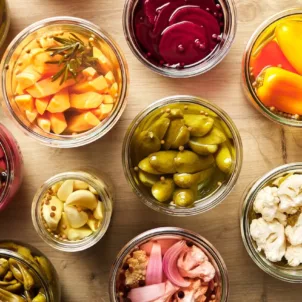Does stress cause constipation? Experts explain how your mental state can influence your bowel movements—and what to do about it.
You’re overwhelmed with work, your calendar is swamped, you haven’t had a proper Netflix-and-chill night in ages, and now, to top it all off, you’re, uh, backed up. Why does it always seem to happen that your digestive system goes on strike when life gets crazy? It may have you wondering: Does stress cause constipation?
You’ve likely heard about the gut-brain connection, or the concept that your mind (i.e. your mental health) and your gut (i.e. your gastrointestinal, or GI, system) impact one another. The most common example of the mind-gut connection is the feeling of butterflies or nausea just before a big exam or ahead of a work presentation, but that’s not the only way your state of mind impacts your digestion. For example, your mental state can affect your bodily functions (including your bowel movements). We talked to experts about the link between anxiety and stress and constipation.
Does Stress Cause Constipation?

Although not a standalone cause of constipation, stress can be a contributing factor, according to Emily Tills, RDN, a New York-based dietitian. When we find ourselves in a stressful scenario, our mind and body reaction is to have a fight-or-flight response, which comes from our sympathetic nervous system. Part of this stress response starts in the adrenal glands, which are located atop each kidney and produce the body’s stress hormones, cortisol, epinephrine, and norepinephrine.
“When the stress hormones are released, the body suppresses digestion and appetite while increasing heart rate and blood pressure, along with circulating glucose in the bloodstream to help keep blood sugar levels stable,” she says. In many people, the suppressed digestion that occurs during times of stress can lead to bouts of diarrhea followed by constipation, explains Tills.
Here’s why it happens: Blood is directed away from our gastrointestinal tract to other more vital organs, such as the heart and lungs, and this can lead to a slowing of your gut, explains Chicago-based gastroenterologist, Andrew Moore, MD. “Chronic stress can also lead to higher levels of corticotropin-releasing factor (CRF) as well as cortisol, which, over time, can cause changes in gut motility.”
What Else Can Lead to Stress-Induced Constipation?
Of course, stress is hardly the only contributing factor to GI issues such as constipation. There are other compounding factors that can make you more likely to experience constipation when you’re stressed. Why? When you’re in a state of stress, you’re less likely to take care of yourself (think: properly hydrating, eating a nutrient-rich diet, and getting movement into your day.) Without these basic elements to help us function at our peak, we may be more prone to constipation, explains Emily Guarnotta, PsyD, psychologist, and blogger at The Mindful Mommy. “A healthy diet filled with fiber, healthy fats, and dense nutrients as well as exercise and water, help encourage movement in your digestive system,” she says. “Eating an unhealthy diet, not drinking enough water, and not moving your body while stressed can lead to constipation, which may contribute to even more stress.”
How to Reduce Constipation When You’re Stressed

Unfortunately, you can’t totally eliminate the various stressors you might be experiencing in life. But if you’re prone to constipation stress, there are tried-and-true ways you can reduce or head off constipation if you’re going through a stressful period. Here’s how.
Stay Hydrated
The best—and easiest—thing you can do to prevent and relieve constipation is to ensure you’re drinking adequate amounts of water, according to Tills. “Water is absorbed in the colon, which is the last stop in the digestive tract, meaning water is moving everything along,” she says. Just how much water should you be drinking? About 15.5 cups per day for men and 11.5 cups per day for women, per The US National Academies of Sciences, Engineering, and Medicine. It’s worth pointing out that this recommendation can vary depending on your weight, age, any medications you take, and how much you exercise.
Increase the Color in Your Diet
You’ve heard “eat the rainbow” before, but it’s particularly helpful for fending off constipation. The more colorful your diet is when it comes to produce, the more nutrients you’ll be gleaning. Aim for a bevy of hues, including blue and purple (plums, blackberries, dates, eggplants), green (spinach, cucumbers, cabbage, kale), and orange and yellow (oranges, butternut squash, sweet potatoes). “Fruits and vegetables are high in insoluble fiber, which is the fiber that can be a sweep for your digestive system,” adds Tills. “Having them every couple hours will be most helpful with preventing the issue of constipation.”
Make Time for Movement
If a crazy schedule is feeding into your stress, it may not be realistic to get in hour-long workout sessions, but quick sessions (like a 30-minute treadmill walk or a few booty-shaping exercises) can make all the difference. Moving your body is important for a healthy digestive tract. If you are feeling constipated, Dr. Guarnotta recommends trying some cardio, whether it’s walking, running, or cycling, to get your blood pumping. “Even some yoga postures put pressure on your digestive tract and can help support movement—plus it offers stress-relieving benefits as well,” she adds.
Take a Probiotic
Research published in The American Journal of Clinical Nutrition has shown that supplementing with probiotics, or bacteria that is good for your gut, may help improve symptoms of constipation. “Specifically, supplementing with Bifidobacterium lactis, helped to improve gut transit time, stool consistency, and stool frequency among people with constipation,” says Jenna Volpe, RDN, LD, CLT, digestive health dietitian. While more research needs to be done to show a clear connection, a probiotic supplement such as Gut Instinct, certainly can’t hurt.
Consider a Fiber Supplement
Fiber is one of the most important nutrients necessary for proper digestion, so you should be making sure you’re getting at least 25-35g daily, notes Dr. Moore. If you’re not keen on fiber-rich foods, like beans, broccoli, avocado, and berries, he recommends supplementing with an over-the-counter fiber supplement.
Meditate
There’s plenty of research to support the stress-relieving benefits of meditation, the practice of centering your mind around a singular focus while trying to shut out all of the other noise in your life.
As a mental health professional, Dr. Guarnotta strongly recommends that her clients practice some form of mindfulness or meditation each day as a preventative measure for stress. “Not only is meditation a useful tool when you are under stress, but practicing it in this preventative way can increase the likelihood that you remain calm and in control when faced with a stressor,” she says. “You can practice on your own by focusing on your breathing, or try a video or meditation app, like Calm.”
Focus on What You Can Control
From a mental health perspective, it’s always a good idea to try to let go of the things that you can’t control, as they’ll only continue to cause unnecessary stress in your life. If you’re feeling stressed, Dr. Guarnotta recommends identifying what you can control in the situation by asking yourself “What can I do about this?”
“If something comes to mind, take action or create a plan to do that thing that will increase your sense of control and reduce stress,” she says. “If there is nothing that you can do in a situation, then you need to practice acceptance and letting go.”
Don’t Multitask During Your Meals
If you frequently eat your lunch while you’re in the middle of something else, whether it’s work or scrolling through your Instagram feed, you might not be digesting your food properly, warns Volpe. “Eating while multitasking makes it more likely that we will not chew our food as well, which increases the digestive burden on the gut,” she says. “Chewing each bite at least 30 times is said to be a helpful way to increase the efficiency of digestion in my field of functional nutrition.”
The Takeaway
While stress can contribute to constipation, adjusting your diet, movement, self-care, and hydration can help you regulate your digestion. Dr. Moore emphasizes the importance of taking the onset of any new uncomfortable symptoms, including constipation, seriously. “Any change in bowel habits should be evaluated by a physician, as this can sometimes be an early sign of colon cancer,” he warns. If you find out that your constipation is stress-related, he recommends meeting with a mental health professional who can help provide you with tools and solutions to help limit the stress in your life.








